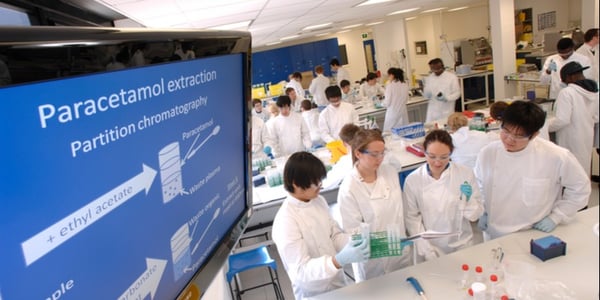Study biomedical sciences and you’ll learn all about microbiology, genetics, biochemistry and pharmacology. The degree will teach you how the human body fights disease and how cutting-edge scientific discoveries are leading to the creation of new treatments. All of this detailed knowledge will help you in your future career.
Here are the different career options available with a biomedical sciences degree.

Biomedical scientist
As a biomedical scientist, you’ll be responsible for carrying out tests on samples that will help to diagnose and treat diseases. The results you produce will directly lead to patients receiving the treatment they need.
Your work would be extremely important to various hospital departments and you’d be expected to produce results quickly and effectively.
There are four different options that biomedical scientists eventually specialise in - infection sciences, cellular sciences, blood sciences or genetics and molecular pathology.
Forensic scientist
Forensic scientists examine and test materials that have been collected at crime scenes. This can include blood, hair and other fragments that may give a clearer idea of what happened. You may need to present this evidence in person at a court hearing.
The area you specialise in determines the crimes you’ll be helping to solve. For example, chemistry specialists work on cases like suspected arson. You’ll be finding flammable substances that may have been used to start fires.
Forensic scientists are always in high demand, usually working for commercial companies that provide these forensic science services to the police.
Microbiologist
One biomedical sciences degree option is a career as a microbiologist. Most commonly, microbiologists work for the NHS or Public Health England. Their responsibilities vary depending on their special area of study.
Microbiologists can be responsible for developing new green technologies or finding ways to prevent disease. For example, you’d work in a laboratory to develop new vaccines or monitor microorganisms.
So, your work would improve people’s lives and have a significant impact on the world around you. You can then specialise in certain fields to further your career progression.
Toxicologist
If you’re happiest when you’re carrying out scientific experiments, then a career as a toxicologist could be right for you. One popular biomedical sciences degree option is to work as a toxicologist and evaluate the impact of different toxic materials.
Your work would mostly consist of different scientific studies where you’d take possibly harmful substances and see how they react to humans, animals and plants. This information is then used for a variety of different purposes.
Like many of the roles in this blog post, toxicology is an area that has a lot of different specialisms. This allows you to find the role that best suits your interests and skills. For example, different areas of toxicology include clinical, forensic, occupational and pharmaceutical.
Phlebotomist
A biomedical sciences degree can be used for more than just laboratory work. Some graduates go on to a career as a phlebotomist. A phlebotomist’s job is to take blood samples from patients to help diagnose illnesses.
This role requires good bedside manner and a steady hand as it isn’t always easy to find a vein with the needle. Once you’ve taken a patient’s blood, you’ll need to make sure it’s labelled and stored correctly before it’s sent off for testing.
Roles like phlebotomist provide thorough training, so don’t worry if you don’t think you have the right skills or experience.
Science journalist/writer
If you’ve always enjoyed writing as much as you love science, then a career as a science writer might be for you. Newspapers and scientific publications are always looking for passionate and talented writers to join their team.
You’ll cover the industry’s biggest news, the latest innovations and carry out interviews with the brightest scientific minds. A biomedical sciences degree shows employers that you have the detailed knowledge needed to create in-depth content about science.
To follow a career in science writing, we’d recommend running a science blog or working with an online news site where possible. You need to make sure your writing is up to the same level as your science knowledge.
University lecturer
You’ve spent years understanding the subject and developing your expertise. Now it’s time to pass that on to the next generation. You’d deliver lectures, seminars and tutorials to undergraduate students who are eager to learn.
While lecturing, you’ll be able to work on your own research too. This can lead to your work being published in books or articles, raising the profile of both you and the university.
If you’ve always loved helping others to learn, then use your biomedical sciences degree to start a career as a lecturer. After also studying a Master’s degree and a PhD, you’ll then be eligible for a position at any top university.
Deciding on your career is no easy choice and there’s a lot of information that you need to know before making your decision.
Plan your future career with our guide
There are so many different possible career paths with a degree. It’s up to you to decide what you like and what you want to do in the future. We’ve put together a guide that’s packed with useful information and advice to help you make a choice you’ll be happy with in the future.
It can help you to plan your ideal career path and includes a checklist to make sure you’re heading in the right direction. Download your free copy of the guide now using the link below.
